Emotional withholding is the type of abuse that is the least identified and talked about, but nonetheless one that can be extremely painful and emotionally destructive.
The Pain of Emotional Withholding
Confession:
I’ve been holding out on you. When I wrote The 7 Deadly Signs of a Dysfunctional Relationship, I left out the eighth: emotional withholding. A reader pointed this out in a haunting comment. Sara wrote:
What’s missing from this discussion is the kind of dysfunction that isn’t tyrannical but instead quietly sucks out your integrity and self-respect because there are NO fights or fireworks. This is the passive-death non-relationship in which every dissatisfaction you express is completely ignored or casually dismissed. Not with a bang but a whimper.
Wow. Right? In my response to Sara’s comment I directed her to a post I’d published on my blog a while back on emotional withholding.
It starts out like this:
If you’ve lived with a dysfunctional partner, chances are you’ve experienced it.
Coldness replaces warmth.
Silence replaces conversation.
Turning away replaces turning towards.
Dismissiveness replaces receptivity.
And contempt replaces respect.
Emotional withholding is, I believe, the toughest tactic to deal with when trying to create and maintain a healthy relationship because it plays on our deepest fears—rejection, unworthiness, shame and guilt, the worry that we’ve done something wrong or failed or worse, that there’s something wrong with us.
Related: Covert Verbal Abuse: Passive Aggressive Behavior That Aims to Control You
You’re locked in the meat freezer with the upside-down carcasses of cows and pigs, shivering, as your partner casually walks away from the giant steel door.
You’re desperately lonely, even though the person who could comfort you by sharing even one kind word is right there, across from you at the dinner table, seated next to you at the movie, or in the same bed with you, back turned, deaf to your words, blind to your agony, and if you dare to reach out, scornful of your touch.
When you speak, you might as well be talking to the wall, because you’re not going to get an answer, except maybe, if you’re lucky, a dismissive shrug.
And the more you talk about anything that matters to you, the more you try to assert that you matter, the more likely your withholding partner is to belittle or ignore what you’re saying and leave you in the cold.
Awful but true—you actually wish for the fight, the fireworks that Sara points out are not flashing, because even a shouting match, an ugly scene, would involve an exchange of words because even physical conflict would constitute physical connection, because fire, even if it burns you, is preferable to ice.
Imagine saying something three, four, even five times to your partner and receiving no response. Or maybe, you get a grunt.
You ask yourself, am I here?
Do I mean anything to this person?
Do I matter? Do I even exist? If you cry alone on the polar icecap of emotional withholding, and there’s no one there to hear you, did you actually make a sound?
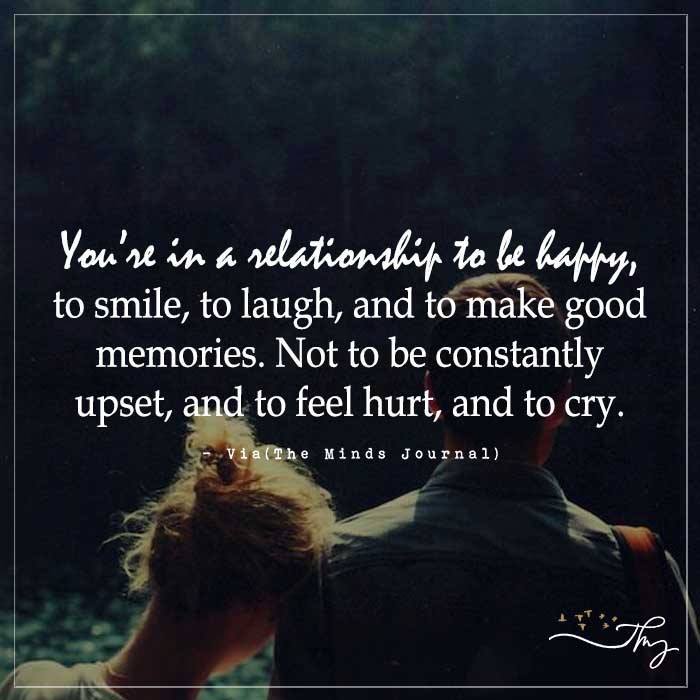
Your accomplishments go unrecognized, your contributions unmentioned, your presence at best grudgingly acknowledged, and any effort at bridging the chasm is spurned. The rope you throw over the crevasse lashes back at you, whipping in the winter wind.
You become pathetic—pleading, begging, literally on your knees, apologizing for everything, offering things that are distasteful to you, promising to be better, just to re-secure your partner’s affection.
But you’re like the dying Eskimo elder, wrapped in sealskin and placed on an ice floe to float away into the great beyond. Only you’re screaming, “I’m not dying! I’m not even sick! I’m perfectly healthy!” as your partner’s silence speaks the words, “You’re dead to me.”
And death, death enters your consciousness as an option. Death begins to feel like a viable alternative, a way to achieve relief from the unbearable pain.
Emotional withholding is typically a response to your trying to stand up for yourself, to an assertion of your rights within the relationship.
And perhaps the deepest pain of all comes from your partner’s insistence that you deserve to be treated this way, deserve to be punished, and, to paraphrase my older post, your partner’s absurd argument that if you just give up your silly notion of having a healthy, communicative relationship between two equal partners and resubmit to emotional domination and abuse, the caring, compassion, communication, and connection, the warmth and the love, will return.
And they might—for five minutes, five hours, even five days—until you assert your yourself again.
The truth is, caring, compassion, communication, connection, warmth, and love should NEVER be conditional and NEVER be willfully withheld, EVER, unless the relationship is already over and you need to draw a boundary to establish your new life and preserve your own sanity.
Withholding these within a relationship is abuse, a kind of emotional blackmail, no different from the other kind that threatens to hurt you where you’re most vulnerable if you don’t comply with your partner’s desires or needs.
But the harder you work towards creating a healthy relationship, the more your dysfunctional partner will withhold the very things on which the health of the relationship depends.
This is how your relationship becomes “the passive-death non-relationship” that Sara mentions, and you feel emptied instead of filled, hollowed instead of hallowed, sunk under the weight of scorn and silence instead of buoyed by the lift of love.
Related: 5 Signs Your Relationship Is Already Over and It’s Time To Let Go
Confession:
When your partner withholds, after a while you give up and start doing it too. This creates the death-spiral in which both partners abandon the relationship, slink into siege mode behind the walls of their fortresses, and try to starve each other out until someone capitulates, crawling forward with a parched throat on withered limbs, begging for a sip of water and a scrap of food.
There’s only one way to deal effectively with a partner who withholds from you, and it’s this: You must make it clear that the relationship is OVER, FOREVER, if your partner does not start acknowledging you and communicating.
This is the only tactic that has a chance of working because the withholding partner doesn’t actually want the relationship to end. Your tormentor is deriving too much satisfaction out of dispensing punishment and seeing you suffer.
Why you might want to remain with a sadist is your own business, but if you do want to try to save it, you have to threaten to leave and be willing to make good on your word if things don’t improve quickly.
And if they do improve, you have to insist that you will be out the door if it ever, ever happens again.
Written by Thomas G. Fiffer Originally appeared in The Good Men Project
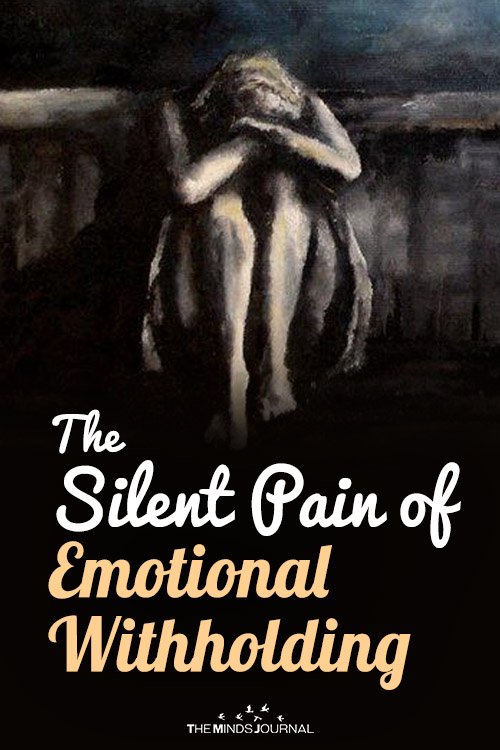
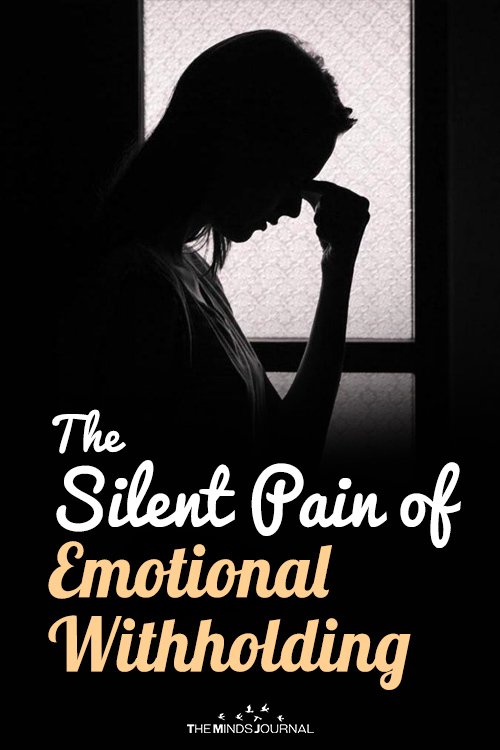
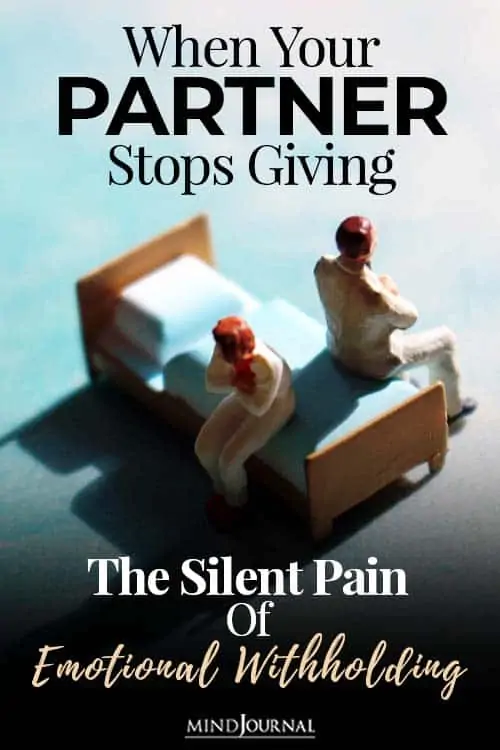
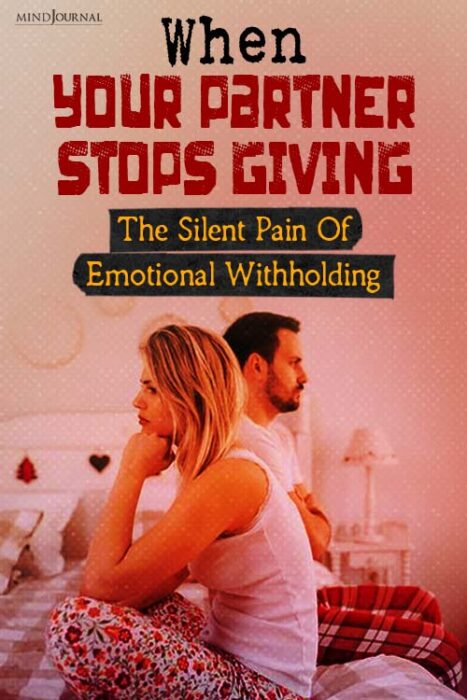
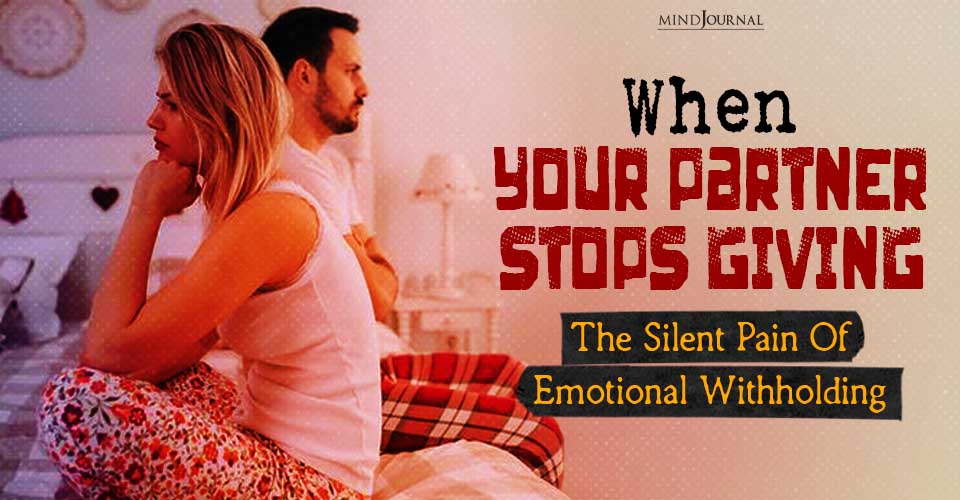







Leave a Reply
You must be logged in to post a comment.